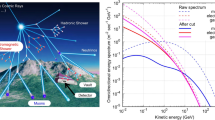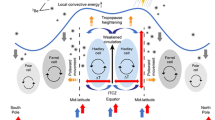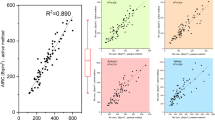Abstract
IT has been pointed out by several authors that the concentration of polonium-210 (radium-F) in rain water is lower than that which would result from the radioactive equilibrium between lead-210 (radium-D) and polonium-210 (radium-F)1,2 (the decay chain, it should be remembered, is: 
This is a preview of subscription content, access via your institution
Access options
Subscribe to this journal
Receive 51 print issues and online access
$199.00 per year
only $3.90 per issue
Buy this article
- Purchase on Springer Link
- Instant access to full article PDF
Prices may be subject to local taxes which are calculated during checkout
Similar content being viewed by others
References
Burton, W. M., and Stewart, N. G., Nature, 186, 584 (1960).
Lehmann, L., and Sittkus, A., Naturwiss., 46, 1, 9 (1959).
Lambert, G., and Nezami, M., Annal. Geophysique (in the press).
Author information
Authors and Affiliations
Rights and permissions
About this article
Cite this article
LAMBERT, G., NEZAMI, M. Determination of the Mean Residence Time in the Troposphere by Measurement of the Ratio between the Concentrations of Lead-210 and Polonium-210. Nature 206, 1343–1344 (1965). https://doi.org/10.1038/2061343a0
Issue Date:
DOI: https://doi.org/10.1038/2061343a0
This article is cited by
-
Beitrag zur Bestimmung der mittleren Verweildauer von natürlichen Aerosolen. II
Archiv für Meteorologie, Geophysik und Bioklimatologie Serie A (1970)
-
Beitrag zur Bestimmung der mittleren Verweildauer von natürlichen Aerosolen; Methodik und erste Ergebnisse
Archiv für Meteorologie, Geophysik und Bioklimatologie Serie A (1969)
Comments
By submitting a comment you agree to abide by our Terms and Community Guidelines. If you find something abusive or that does not comply with our terms or guidelines please flag it as inappropriate.



